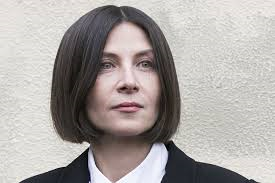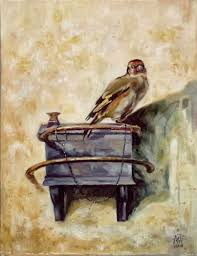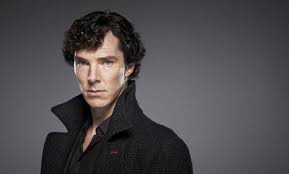Donna Tartt Fabritius’ The Goldfinch
When I was growing up, my favourite literary characters included the usual suspects, Jo and Laurie, Jane Eye and Edward Rochester, Elizabeth and Darcy, Emma and Mr Knightley, Scarlett and Rhett, Pip and Estella. They all felt very real. If they were girls, I would often identify with them; if they were boys, I’d sigh deeply into my pillow. Characters were more important to me then than a novel’s form, style and purpose. As a child, I rarely thought about how a novelist had created plot. Whether I was swept away by a book through my love of characters was my only value judgment.
By my teens, heroes had well and truly trumped heroines in my romantic imagination and I was completely smitten, (eclectically but not necessarily simultaneously) by Howard Roark, Sydney Carlton, Daniel Deronda, Joseph K, Stephen Dedalus, Count Vronsky, Julien Sorel, even the infamous Vicomte de Valmont.
There was usually something dark or dangerous about these male characters – depressed or tortured souls, some had a cruel, sadistic streak; or they were artists and visionary dreamers, philosophers and sinners. All, though, were larger than life, highly intelligent and drawn with insight and empathy. By this stage I had become more conscious of literary devices and authorial voice, and obviously took note of a character’s physical descriptions. Yet in my fantasies, the heroes I longed for were all tall and saturnine and bore a strong resemblance to Daniel Day-Lewis or Kevin Klein. It took a few more years (and my first love affairs) for female characters to get a look in once more.
Our attraction to fictional characters is both passionate and possessive. In her book, Why Do We Care About Literary Characters?, author Blakey Vermeule asks: “Why should we spend attention on people who will never care about us in return?” The reason, she explains, is curiosity: we may idly speculate about the lives of people we see on trains and buses, knowing we will probably never see them again. But when we read, we are in a highly privileged position, able to go on a journey with characters and enter their world intimately. We know them, warts and all, with an immediacy we rarely have with people we meet in everyday life.
So we fight on the battlefield alongside Napoleon in War and Peace, steal handkerchiefs with the Artful Dodger, glory in Jean Brodie’s prime and approve Martha Quest’s political coming of age. By entering this world willingly, we gain social information that would often be, according to Vermeule, “too costly, dangerous, and difficult to extract from the world on our own.” This trade-off in turn builds attachment to story-line and character.
So much for science. As readers, we’re hard-wired to seek out memorable heroes and heroines Yet, despite the many novels I’ve read, few characters have stayed with me as vividly as the ones I encountered in my youth. That is until I met Boris, who appears in Donna Tartt’s new novel, The Goldfinch.
Let me preface this by saying that until now, I wasn’t a fan of Tartt’s. I disliked her debut novel, The Secret History. Of course she had talent, but I didn’t care for a murder in a stuffy college committed by a group of over-privileged, over-reaching spoilt brats. So I chose not to read her second novel. But The Goldfinch, published late last year, intrigued me. First, it is an imaginary story about a real 17th century painting, the Dutch masterpiece The Goldfinch, painted by Fabritius. I adore that painting, as I love all Dutch Old Masters. Fabritius was a pupil of Rembrandt and taught Vermeer. Few paintings of his survive, because he was killed at the age of 30, when a munitions factory exploded and much of his work disappeared with him. The Goldfinch was painted in the year of his death.
In her novel, Tartt surmises that the miniature painting (no bigger than a sheet of A4 paper) is taken by 13 year-old Theo, after a terrorist bomb destroys the New York museum in which it is housed. The Goldfinch is part bildungsroman – Theo’s story – but it is also the story of that painting, of moral ambiguities, lost loves and the enduring power of art in a post 9/11 world.
Early on, Theo says the bird reminds him of his beautiful, delicate, arty mother, who is killed in the blast. The painting, one of her favourites, comes to symbolise everything that Theo has lost. But this post isn’t a review of this wonderful, wonderful book, its intricate Dickensian story-lines and fully realised worlds which cross, effortlessly, from psychological drama to thriller and back again. I’m celebrating character, because, when we meet Boris, we come across one of the most loveable, maddening and completely believable creations in contemporary fiction.
After the bombing, Theo reluctantly joins his estranged father in Las Vegas. Through Theo’s eyes we see the vast, crass, cardboard emptiness of that city, in which Theo wanders like a lost soul. But at school he meets Boris, another misfit and an instant connection is born. “He was pale and thin, and not very clean, with lank dark hair falling into his eyes and the unwholesome wanness of a runaway, callused hands and nails chewed to the thumb”.
When they begin talking, Theo marvels at his accent. “Though he spoke English fluently enough, with a strong Australian accent, there was also a dark, slurry undercurrent of something else: a whiff of Count Dracula, or maybe it was KGB agent.”
Boris is from everywhere and nowhere, half Russian, half Polish, swears fluently in four languages, a true global citizen. His father is in the mining business, so he’s lived in Australia, Russia, Scotland, New Zealand, Sweden, Texas, Alaska, Saudi Arabia, New Guinea, Scotland, the Ukraine. As we get to know him, we find he’s tough and tender, irresponsible and compassionate. Both boys are motherless only children, living with drunk, physically violent or neglectful fathers, with no parental guidance and supervision. They’re rootless, so cling to each other, and as their friendship grows, they become closer than brothers.
The story of this lifelong friendship is the indelible marker in The Goldfinch, more lasting even than the fate of the stolen painting. It’s depicted without one grain of sentimentality. The boys fight, play truant, get blind drunk, take drugs. There’s a bit of adolescent horseplay, but the relationship isn’t sexual. As adults, both Boris and Theo end up in that murky zone that hovers between outright criminal behaviour and legitimate business deals, but you can’t help liking them for all that because you understand their history.
At first glance, both men appear irreparably damaged from their childhood traumas. Boris is an alcoholic, Theo, still suffering from Post-Traumatic Stress Disorder, has a hopeless drug dependency. Yet Tartt ensures their relationship is life affirming. There truly is honour among thieves, loyalty, brotherhood. Sometimes, as Boris himself says, “you can do everything wrong and it still turns out to be right.”
Part of the joy of Boris is his Russian-inflected, mangled English, which Tartt renders faultlessly. “My official business so called is housecleaning agency. Workers from Poland, mostly. Nice pun in title of business, too. ‘Polish Cleaning Services’. Get it?” He also a Slavic tendency to overdramatise, frequently ending sentences with an emphatic “Never! I rather drown myself!”, or a telling “Pfa!” Boris’ energy, warmth, volubility, enthusiasm (and, it must be said, undeniable sex appeal) add much to the pleasure of reading the novel. Here he is, reunited after many years, with Popper (Popchik in Boris-speak), Theo’s Maltese terrier he played with as a boy.
“Boris – whooping with laughter – dropped to his knees. “Oh!” snatching him up as Popchik wriggled and struggled. “You got fat! He got fat!” he said indignantly as Popchik jumped up and kissed him on the face. “You let him get fat! Yes hello, poustyshka, little ball of fluff, you, hello! You remember me, don’t you!” He had toppled over on his back, stretched out and laughing, as Popchik – still screaming with joy – jumped all over him. “He remembers me!”
I’m pretty good at predictions. I saw Cate Blanchett in a tiny theatre production here in Melbourne in the early 1990s, and urged all my friends to see her saying I’d just spotted the next great star. So here are a few more:
Boris will spawn fan clubs. There will be Boris soundalike contests. A vodka will be named after him. Consumption of pickled herring, smoked salmon, caviar and truffled eggs will soar. Benedict Cumberbatch will play him in the movie (not only is he great at accents but Boris, like Sherlock, wears a long black coat). And please, please Donna Tartt, can you reincarnate him in another novel, because I’m already suffering withdrawal symptoms?
In the meantime, witty Claire Cameron from The Millions has penned the hilarious “How to Tweet Like Boris” which I share here: http://www.themillions.com/2014/02/how-to-tweet-like-boris-from-the-goldfinch.html. I defy you not to laugh.




February 25, 2014 at 12:59 pm
I’d love to see Boris again as well:)
February 25, 2014 at 3:27 pm
ciao! repettous and long winded. the intellectual and philosophical conclusion that theo extends, and could not possibly had obtained, makes this story preposterous. the story starts well up until theo exits the museum; thereafter the book falls apart with an absurd ‘hollywood’ story line. theo is 13 years old, has not ever travelled outside ny, goes to live in las vegas and becomes a hard core drug user-a drug addict up to the end of the book. we hear about how he feels for his mother in short unconvincing grieving paragraphs , mentioning her about 4 or 5 times throughout the story, although she was the center of his universe. his grief is short lived. theo narrates the story, but the observations are of someone perhaps with a different education and intellect (donna tartt)…when did theo obtain these experiences? how he manages his observations is puzzling as he spends his existence getting high. this is a long winded story that wants to give us an intellectual conclusion -“to dust we return’. yes, as a character, boris was the character.
thebestdressup
February 25, 2014 at 8:34 pm
The book divided critics. I agree the end of the book is not as strong as the preceding plotline. However, it still resonated strongly with me.
March 3, 2014 at 11:20 pm
OK, I will now read this. A few weeks ago a big hardback copy of The Goldfinch arrived for me. A friend had been so struck by the opening which, he claims, is very close to the opening of my novel Unseen Unsung, that he had to send me a copy. Now I had not really enjoyed A Secret History and have since avoided Tartt. Yesterday we had lunch with friends and one on them asked if I had read The Goldfinch, because the opening took him straight back to my novel. I said, you mean it opens in a similar set of circumstances? He said no, it actually feels the same. Hmm… unsettling.
March 3, 2014 at 11:35 pm
How very strange – but I’d take that to be incredibly flattering, Hilary!